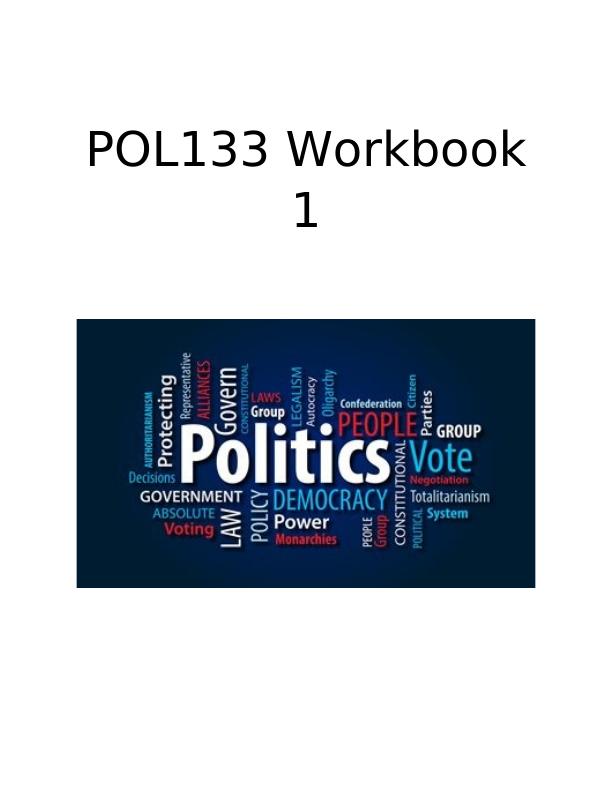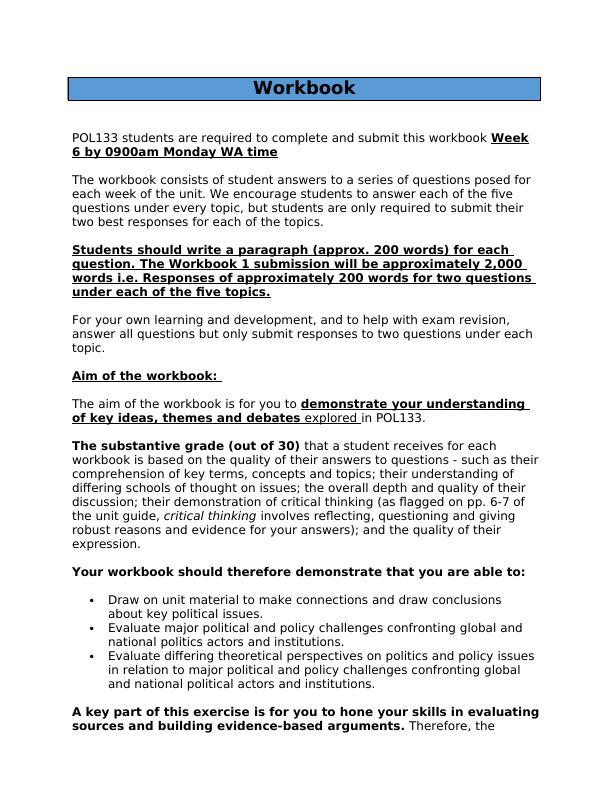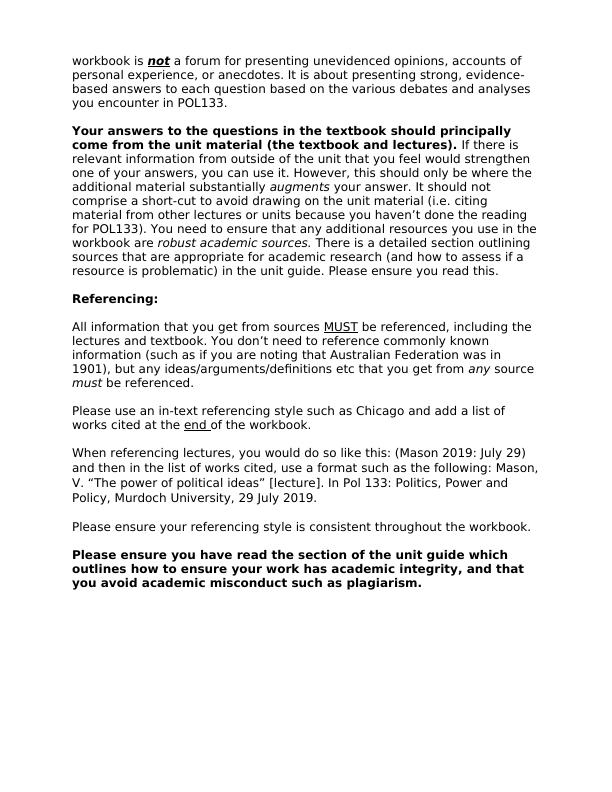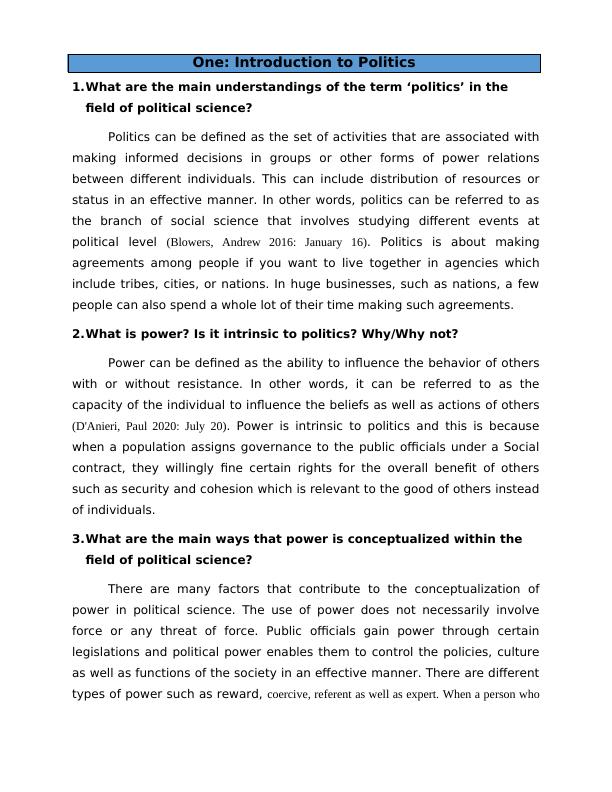POL133 Workbook
Added on 2022-12-16
16 Pages4419 Words1 Views
POL133 Workbook
1
1

Workbook
POL133 students are required to complete and submit this workbook Week
6 by 0900am Monday WA time
The workbook consists of student answers to a series of questions posed for
each week of the unit. We encourage students to answer each of the five
questions under every topic, but students are only required to submit their
two best responses for each of the topics.
Students should write a paragraph (approx. 200 words) for each
question. The Workbook 1 submission will be approximately 2,000
words i.e. Responses of approximately 200 words for two questions
under each of the five topics.
For your own learning and development, and to help with exam revision,
answer all questions but only submit responses to two questions under each
topic.
Aim of the workbook:
The aim of the workbook is for you to demonstrate your understanding
of key ideas, themes and debates explored in POL133.
The substantive grade (out of 30) that a student receives for each
workbook is based on the quality of their answers to questions - such as their
comprehension of key terms, concepts and topics; their understanding of
differing schools of thought on issues; the overall depth and quality of their
discussion; their demonstration of critical thinking (as flagged on pp. 6-7 of
the unit guide, critical thinking involves reflecting, questioning and giving
robust reasons and evidence for your answers); and the quality of their
expression.
Your workbook should therefore demonstrate that you are able to:
Draw on unit material to make connections and draw conclusions
about key political issues.
Evaluate major political and policy challenges confronting global and
national politics actors and institutions.
Evaluate differing theoretical perspectives on politics and policy issues
in relation to major political and policy challenges confronting global
and national political actors and institutions.
A key part of this exercise is for you to hone your skills in evaluating
sources and building evidence-based arguments. Therefore, the
POL133 students are required to complete and submit this workbook Week
6 by 0900am Monday WA time
The workbook consists of student answers to a series of questions posed for
each week of the unit. We encourage students to answer each of the five
questions under every topic, but students are only required to submit their
two best responses for each of the topics.
Students should write a paragraph (approx. 200 words) for each
question. The Workbook 1 submission will be approximately 2,000
words i.e. Responses of approximately 200 words for two questions
under each of the five topics.
For your own learning and development, and to help with exam revision,
answer all questions but only submit responses to two questions under each
topic.
Aim of the workbook:
The aim of the workbook is for you to demonstrate your understanding
of key ideas, themes and debates explored in POL133.
The substantive grade (out of 30) that a student receives for each
workbook is based on the quality of their answers to questions - such as their
comprehension of key terms, concepts and topics; their understanding of
differing schools of thought on issues; the overall depth and quality of their
discussion; their demonstration of critical thinking (as flagged on pp. 6-7 of
the unit guide, critical thinking involves reflecting, questioning and giving
robust reasons and evidence for your answers); and the quality of their
expression.
Your workbook should therefore demonstrate that you are able to:
Draw on unit material to make connections and draw conclusions
about key political issues.
Evaluate major political and policy challenges confronting global and
national politics actors and institutions.
Evaluate differing theoretical perspectives on politics and policy issues
in relation to major political and policy challenges confronting global
and national political actors and institutions.
A key part of this exercise is for you to hone your skills in evaluating
sources and building evidence-based arguments. Therefore, the

workbook is not a forum for presenting unevidenced opinions, accounts of
personal experience, or anecdotes. It is about presenting strong, evidence-
based answers to each question based on the various debates and analyses
you encounter in POL133.
Your answers to the questions in the textbook should principally
come from the unit material (the textbook and lectures). If there is
relevant information from outside of the unit that you feel would strengthen
one of your answers, you can use it. However, this should only be where the
additional material substantially augments your answer. It should not
comprise a short-cut to avoid drawing on the unit material (i.e. citing
material from other lectures or units because you haven’t done the reading
for POL133). You need to ensure that any additional resources you use in the
workbook are robust academic sources. There is a detailed section outlining
sources that are appropriate for academic research (and how to assess if a
resource is problematic) in the unit guide. Please ensure you read this.
Referencing:
All information that you get from sources MUST be referenced, including the
lectures and textbook. You don’t need to reference commonly known
information (such as if you are noting that Australian Federation was in
1901), but any ideas/arguments/definitions etc that you get from any source
must be referenced.
Please use an in-text referencing style such as Chicago and add a list of
works cited at the end of the workbook.
When referencing lectures, you would do so like this: (Mason 2019: July 29)
and then in the list of works cited, use a format such as the following: Mason,
V. “The power of political ideas” [lecture]. In Pol 133: Politics, Power and
Policy, Murdoch University, 29 July 2019.
Please ensure your referencing style is consistent throughout the workbook.
Please ensure you have read the section of the unit guide which
outlines how to ensure your work has academic integrity, and that
you avoid academic misconduct such as plagiarism.
personal experience, or anecdotes. It is about presenting strong, evidence-
based answers to each question based on the various debates and analyses
you encounter in POL133.
Your answers to the questions in the textbook should principally
come from the unit material (the textbook and lectures). If there is
relevant information from outside of the unit that you feel would strengthen
one of your answers, you can use it. However, this should only be where the
additional material substantially augments your answer. It should not
comprise a short-cut to avoid drawing on the unit material (i.e. citing
material from other lectures or units because you haven’t done the reading
for POL133). You need to ensure that any additional resources you use in the
workbook are robust academic sources. There is a detailed section outlining
sources that are appropriate for academic research (and how to assess if a
resource is problematic) in the unit guide. Please ensure you read this.
Referencing:
All information that you get from sources MUST be referenced, including the
lectures and textbook. You don’t need to reference commonly known
information (such as if you are noting that Australian Federation was in
1901), but any ideas/arguments/definitions etc that you get from any source
must be referenced.
Please use an in-text referencing style such as Chicago and add a list of
works cited at the end of the workbook.
When referencing lectures, you would do so like this: (Mason 2019: July 29)
and then in the list of works cited, use a format such as the following: Mason,
V. “The power of political ideas” [lecture]. In Pol 133: Politics, Power and
Policy, Murdoch University, 29 July 2019.
Please ensure your referencing style is consistent throughout the workbook.
Please ensure you have read the section of the unit guide which
outlines how to ensure your work has academic integrity, and that
you avoid academic misconduct such as plagiarism.

One: Introduction to Politics
1.What are the main understandings of the term ‘politics’ in the
field of political science?
Politics can be defined as the set of activities that are associated with
making informed decisions in groups or other forms of power relations
between different individuals. This can include distribution of resources or
status in an effective manner. In other words, politics can be referred to as
the branch of social science that involves studying different events at
political level (Blowers, Andrew 2016: January 16). Politics is about making
agreements among people if you want to live together in agencies which
include tribes, cities, or nations. In huge businesses, such as nations, a few
people can also spend a whole lot of their time making such agreements.
2.What is power? Is it intrinsic to politics? Why/Why not?
Power can be defined as the ability to influence the behavior of others
with or without resistance. In other words, it can be referred to as the
capacity of the individual to influence the beliefs as well as actions of others
(D'Anieri, Paul 2020: July 20). Power is intrinsic to politics and this is because
when a population assigns governance to the public officials under a Social
contract, they willingly fine certain rights for the overall benefit of others
such as security and cohesion which is relevant to the good of others instead
of individuals.
3.What are the main ways that power is conceptualized within the
field of political science?
There are many factors that contribute to the conceptualization of
power in political science. The use of power does not necessarily involve
force or any threat of force. Public officials gain power through certain
legislations and political power enables them to control the policies, culture
as well as functions of the society in an effective manner. There are different
types of power such as reward, coercive, referent as well as expert. When a person who
1.What are the main understandings of the term ‘politics’ in the
field of political science?
Politics can be defined as the set of activities that are associated with
making informed decisions in groups or other forms of power relations
between different individuals. This can include distribution of resources or
status in an effective manner. In other words, politics can be referred to as
the branch of social science that involves studying different events at
political level (Blowers, Andrew 2016: January 16). Politics is about making
agreements among people if you want to live together in agencies which
include tribes, cities, or nations. In huge businesses, such as nations, a few
people can also spend a whole lot of their time making such agreements.
2.What is power? Is it intrinsic to politics? Why/Why not?
Power can be defined as the ability to influence the behavior of others
with or without resistance. In other words, it can be referred to as the
capacity of the individual to influence the beliefs as well as actions of others
(D'Anieri, Paul 2020: July 20). Power is intrinsic to politics and this is because
when a population assigns governance to the public officials under a Social
contract, they willingly fine certain rights for the overall benefit of others
such as security and cohesion which is relevant to the good of others instead
of individuals.
3.What are the main ways that power is conceptualized within the
field of political science?
There are many factors that contribute to the conceptualization of
power in political science. The use of power does not necessarily involve
force or any threat of force. Public officials gain power through certain
legislations and political power enables them to control the policies, culture
as well as functions of the society in an effective manner. There are different
types of power such as reward, coercive, referent as well as expert. When a person who

End of preview
Want to access all the pages? Upload your documents or become a member.
Related Documents
Understanding Individuals and Societylg...
|24
|9830
|27
Understanding Individuals and Society Portfoliolg...
|26
|5719
|252
Understanding Individuals and Societylg...
|21
|4837
|22
Workbook on Body Compartments, Cell and Homeostasis for Biosciences in Nursinglg...
|19
|3889
|51
Biosciences Workbook Week 2: The Skin, Wound Healing, Temperature Regulationlg...
|14
|3538
|332
Biosciences for Nursing Workbook Week 2: The Skin, Wound Healing, Temperature Regulationlg...
|14
|3538
|172
